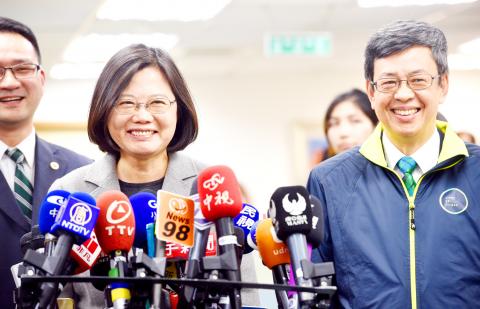The first Democratic Progressive Party (DPP) Central Standing Committee meeting chaired by president-elect Tsai Ing-wen (蔡英文) yesterday affirmed that the new legislative speaker would remain neutral and not be at the whim of the party.
“The legislative speaker will not attend party events, will not hold positions within the party and will not be present in negotiations between political parties,” DPP spokesperson Juan Chao-hsiung (阮昭雄) told a post-meeting press conference.
Specifically, the person holding the position would not attend party events, the DPP Central Standing Committee meetings, national congress meetings, parades and social activism events otherwise hosted by the party and cannot stump for the party nominees in elections, Juan said.

Photo: Lo Pei-der, Taipei Times
The individual would not hold any position in the party and would refrain from attending bipartisan negotiations in the legislature, or between the legislature and the Executive Yuan, unless their presence is mandated under the Constitution or is otherwise approved by the president, Juan said.
The strict neutrality of the legislative speaker is one of the five political reforms the DPP is aiming for, Juan said, adding that the decreased influence of the party over the legislative speaker would serve to keep the individual clear of party squabbles and guarantee the viability of the political system.
Voters have handed the DPP its first majority in the legislature and the party should live up to public expectations and implement legislative reforms, Juan said.
While Tsai affirmed that she would respect the DPP legislative caucus’ autonomy, she said her focus is not on whom holds the position of legislative speaker, but how the individual could remain neutral.
Meanwhile, Central Standing Committee member Frank Hsieh (謝長廷), a former premier, suggested that the DPP’s caucus should, despite Tsai’s respect for its autonomy, nonetheless discuss who would best suit the position of legislative speaker.
Hsieh said that in the past, the DPP caucus and the committe were parallel organizations, but in light of the Chinese Nationalist Party’s (KMT) caucus choosing to bow to party will over public opinion, the DPP must look to a new system to avoid repeating those mistakes.
While political commentators point to the alleged support of both the Hsieh faction and the Tsai faction for legislator-at-large-elect Su Jia-chyuan (蘇嘉全) to become legislative speaker, Hsieh yesterday said in a Facebook post that he has not committed his support to any individual nor has he expressed such an opinion to the media.
The party should remain unified like it was before the election results and look to implement Tsai’s policies, Hsieh said, adding that any decision reached without negotiation could give the party a bad public image and sour its supporters’ expectations.

NATIONAL SECURITY THREAT: An official said that Guan Guan’s comments had gone beyond the threshold of free speech, as she advocated for the destruction of the ROC China-born media influencer Guan Guan’s (關關) residency permit has been revoked for repeatedly posting pro-China content that threatens national security, the National Immigration Agency said yesterday. Guan Guan has said many controversial things in her videos posted to Douyin (抖音), including “the red flag will soon be painted all over Taiwan” and “Taiwan is an inseparable part of China,” while expressing hope for expedited “reunification.” The agency received multiple reports alleging that Guan Guan had advocated for armed reunification last year. After investigating, the agency last month issued a notice requiring her to appear and account for her actions. Guan Guan appeared as required,

A strong cold air mass is expected to arrive tonight, bringing a change in weather and a drop in temperature, the Central Weather Administration (CWA) said. The coldest time would be early on Thursday morning, with temperatures in some areas dipping as low as 8°C, it said. Daytime highs yesterday were 22°C to 24°C in northern and eastern Taiwan, and about 25°C to 28°C in the central and southern regions, it said. However, nighttime lows would dip to about 15°C to 16°C in central and northern Taiwan as well as the northeast, and 17°C to 19°C elsewhere, it said. Tropical Storm Nokaen, currently

‘NATO-PLUS’: ‘Our strategic partners in the Indo-Pacific are facing increasing aggression by the Chinese Communist Party,’ US Representative Rob Wittman said The US House of Representatives on Monday released its version of the Consolidated Appropriations Act, which includes US$1.15 billion to support security cooperation with Taiwan. The omnibus act, covering US$1.2 trillion of spending, allocates US$1 billion for the Taiwan Security Cooperation Initiative, as well as US$150 million for the replacement of defense articles and reimbursement of defense services provided to Taiwan. The fund allocations were based on the US National Defense Authorization Act for fiscal 2026 that was passed by the US Congress last month and authorized up to US$1 billion to the US Defense Security Cooperation Agency in support of the

PAPERS, PLEASE: The gang exploited the high value of the passports, selling them at inflated prices to Chinese buyers, who would treat them as ‘invisibility cloaks’ The Yilan District Court has handed four members of a syndicate prison terms ranging from one year and two months to two years and two months for their involvement in a scheme to purchase Taiwanese passports and resell them abroad at a massive markup. A Chinese human smuggling syndicate purchased Taiwanese passports through local criminal networks, exploiting the passports’ visa-free travel privileges to turn a profit of more than 20 times the original price, the court said. Such criminal organizations enable people to impersonate Taiwanese when entering and exiting Taiwan and other countries, undermining social order and the credibility of the nation’s